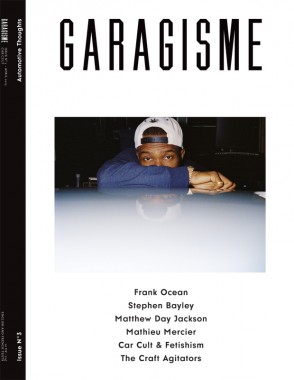
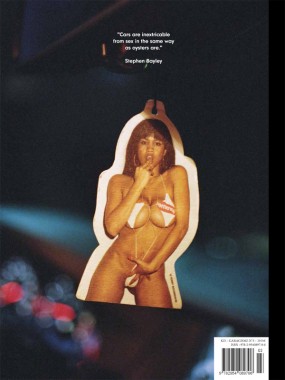
GARAGISME Magazine 3, Car Cult
Softcover, 144 pp., offset 4/4, 240 x 320 mm
English and French
Edition of 2000
ISBN 978-2-9540897-0-6
Published by GARAGISME Éditions
$13.00 ·
GARAGISME is a biannual publication documenting automobile culture / est une publication semestrielle documenter la culture automobile.
1. Frank Ocean: interview by CG Watkins
2. Stephen Bayley: Gender Bending Engines by Alice Pfeiffer
3. Matthew Day Jackson: The work of many hands by Monica Uszerowicz
4. Mathieu Mercier: Car Problems by Romaric Tisserand
5. Timothée Chaillou: Fragrance, a curated selection of artworks
6. The Craft Agitators: portraits of car crafters by Tania Feghali and CG Watkins
7. Il y a des morts élégantes: story by François Coquerel and Oscar Coop Phane
8. Art and Industry: essay by Rose-Marie Barrientos
9. Mégane: portfolio by Fanny Schlichter
10. Hellbenders: portfolio by Joan Cuenco
11. Concrete Island: portfolio by Devin Blair
12. Driving Me Crazy: portfolio by Csilla Klenyánszki
13. Don’t Walk: portfolio by Adrien Toubiana, Antoine Roux and Thomas Cristiani
14. Carhenge or the end of an american dream: essay by Camille Ayme
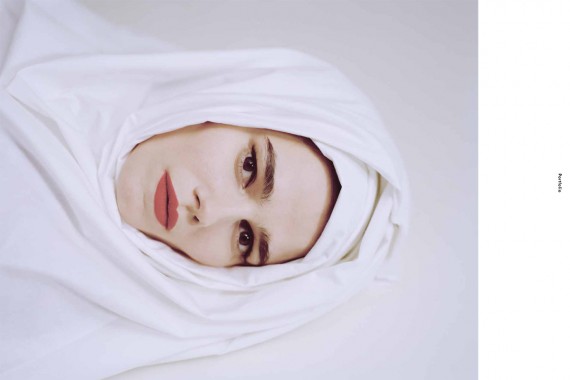
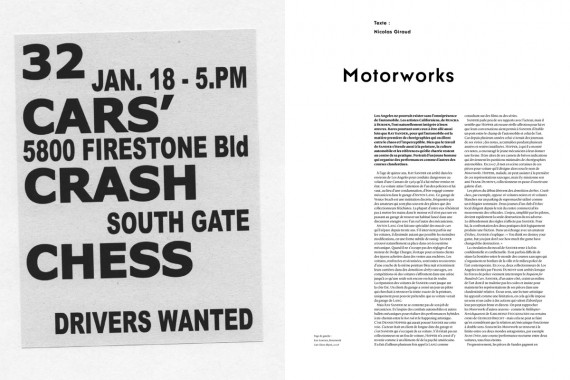
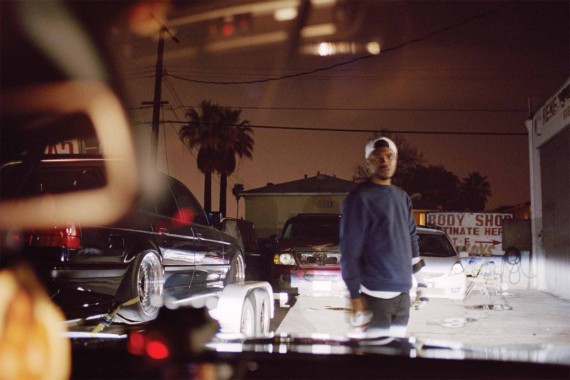
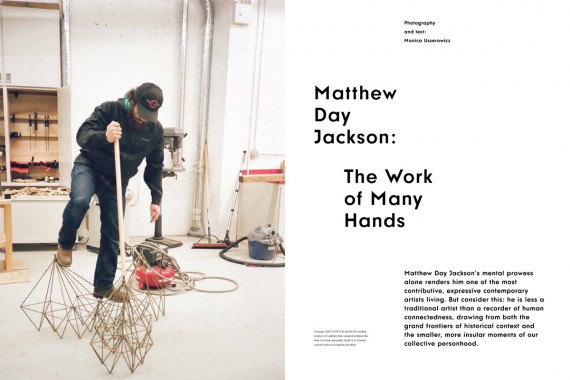
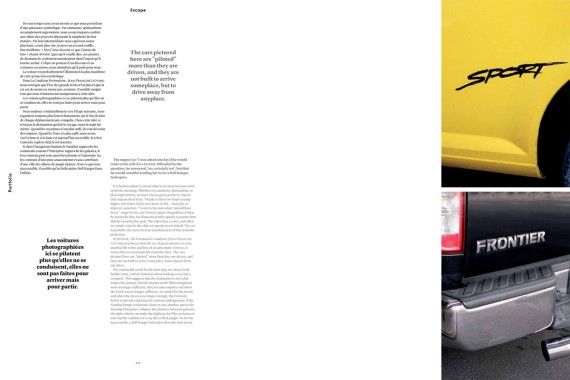
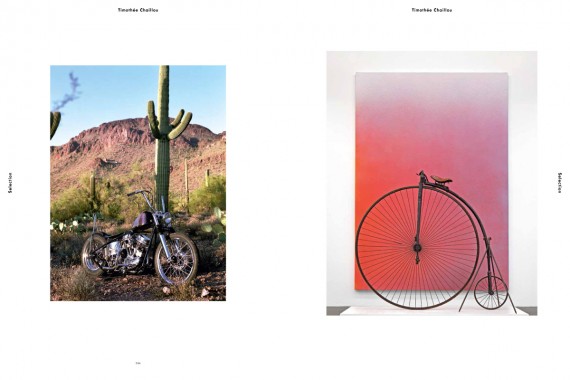
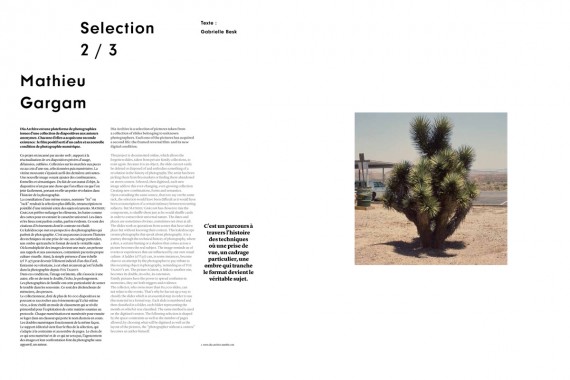
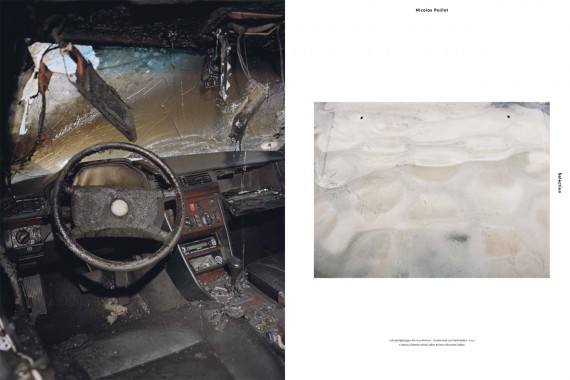
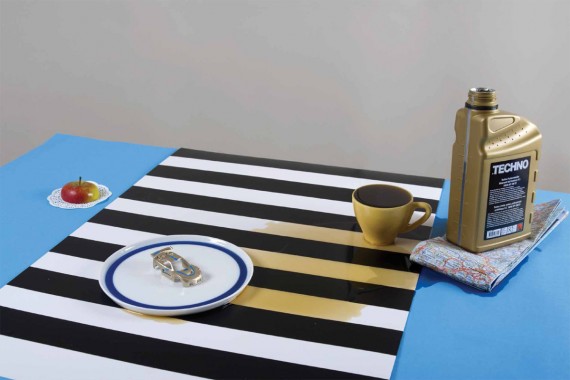
Adrien Toubiana, Alice Pfeiffer, Anne-Sophie Ferrari, Antoine Roux, Camille Ayme, Cars, CG Watkins, Csilla Klenyánszki, Culture, Devin Blair, Distribution, Fanny Schlichter, François Coquerel, Frank Ocean, Garage Grotesk, GARAGISME Éditions, Gilles Uzan, Joan Cuenco, Mathieu Mercier, Matthew Day Jackson, Monica Uszerowicz, Oscar Coop Phane, Romaric Tisserand, Rose-Marie Barrientos, Stephen Bayley, Tania Feghali, Thomas Cristiani, Timothée Chaillou
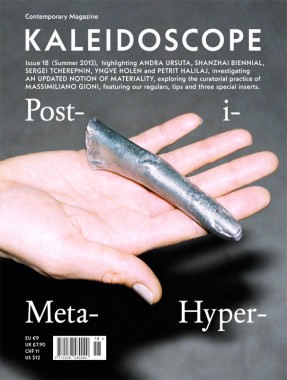
KALEIDOSCOPE Magazine 18 — Summer 2013
Softcover, 228 pp. + three special inserts, offset 4/4, 220 x 287 mm
English edition
ISSN 2038-4807
Published by KALEIDOSCOPE Press
$12.00 ·
KALEIDOSCOPE Issue 18 (summer 2013), highlighting Andra Ursuta, Shanzhai Biennial, Sergei Tcherepnin, Yngve Holen and Petrit Halilaj; investigating an updated notion of materiality; exploring the curatorial practice of Massimiliano Gioni; featuring our regulars, tips, and three special inserts.
HIGHLIGHTS
The issue’s opening section of HIGHLIGHTS features Andra Ursuta, whose practice is understood by Joanna Fiduccia as committed to annihilating sculpture’s distance from our world; the fashion-label-cum-art-project Shanzhai Biennial, whose tangible products, explains Kevin McGarry, are eclipsed by their collateral evidence; Sergei Tcherepnin, described by Lawrence Kumpf as creating a complex system of bodily configurations and social situations; Yngve Holen, whose works are read by Pablo Larios as sentient beings concerned with frustrated circulation, technological growth and associative networking; and Petrit Halilaj whose practice is framed by Elena Filipovic as rejecting pathos in favor of an intimate and critical inflection of the political.
MAIN THEME
This section, titled Post-i-Meta-Hyper-Materiality, brings together a substantial group of artists who introduce the concept of emotional and bodily alienation within the discourse dominated by the readymade, corporate art pursued by many of their digital-native peers. The elusive sculptural works of Nicholas Deshayes, Steve Bishop, Marlie Mul, Magali Reus, Ben Schumacher and Alice Channer are framed by Karen Archey as deeply engaged with materiality and production processes and imbued with bodily allusions, while also commenting on issues of abstraction, dispersion, consumption and technology. A visual essay curated by fashion futurologist Veronica So reveals how, from sculptures designed by digital simulations to edible candies formed by human body scans, the appearance of 3D printing kicks off a range of playful experiments with technology and originality. Also in this section, Alice Channer talks to Rebecca Geldard about the starting point of each work, which she describes as “a moment of material seduction”; and artists Pamela Rosenkratz and Alisa Baremboym discuss physicality versus technology and the shifting boundaries between our bodies and the external world in a cross-interview by Ruba Katrib.
MONO
Comprising an essay by Jonathan Griffin, an interview by Francesco Manacorda and a photographic portrait by Ari Marcopoulos, this issue’s MONO is devoted to the Director of the International Art Exhibition at this year’s Venice Biennale, Massimiliano Gioni. Pragmatic bordering on opportunistic throughout his adventurous career, and yet described as “a hopeless romantic” by one of his most affectionate colleagues, Gioni states that his own failure to understand is what fuels his interest in art. Generally averse to chronological or historically comprehensive presentations and departing from the tautology of the masterpiece, he is instead a proponent of Outsider and self-taught art. His exhibitions, which he defines as products of a collective intelligence, are often concerned with the position of art within our image-based society, as well as the sites of an exploration of interior worlds, dream states and psychological visions.
REGULARS
Finally, it this issue’s REGULARS, Hans Ulrich Obrist and Simon Castets interview emerging artist Amalia Ulman; Gary Carrion-Murayari stages a three-way interview with Valentin Carron and Isabelle Cornaro; Felix Burrichter meets design critic Alice Rawsthorn; Leung Chi Wo, David Clarke and Lam Tung-pang engage in a round table about the art scene in Hong Kong then and now; finally, Laura McLean-Ferristraces the legacy of folk in British contemporary art from the exhibition Black Eyes and Lemonade to the practice of Jeremy Deller.
SPECIAL INSERTS
The edition is enriched by our seasonal TIPS on following, reading, listening, stopping by, meeting and visiting; as well as by three SPECIAL INSERTS, including a selection of paintings by Benjamin Senior, photographs by Jochen Lempert and collages by Sterling Ruby.
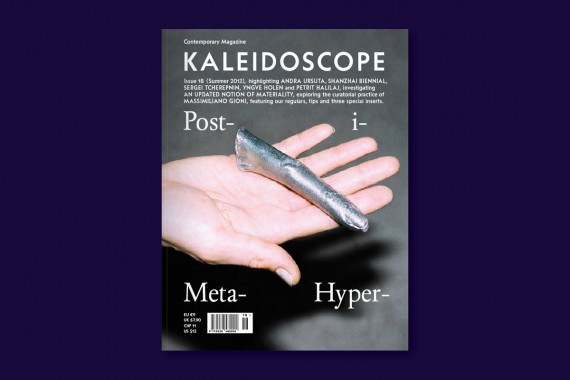
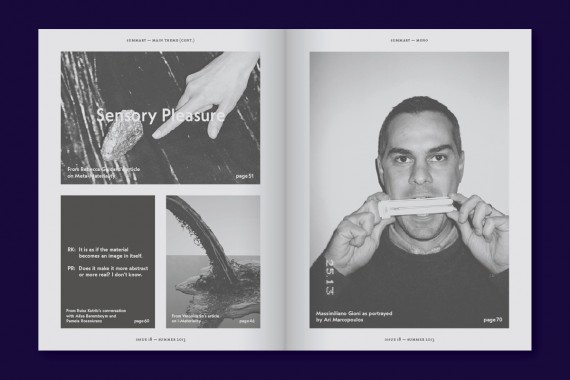
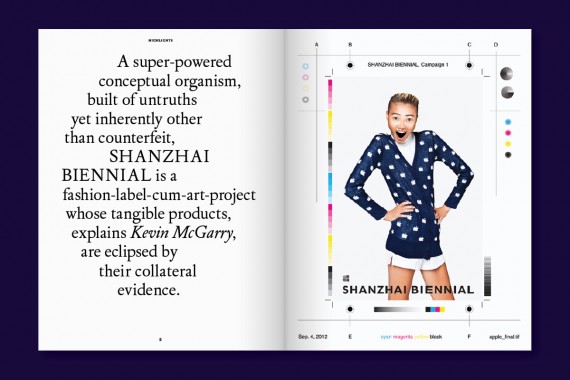
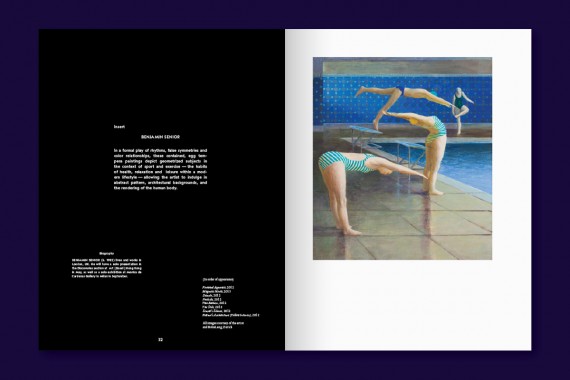
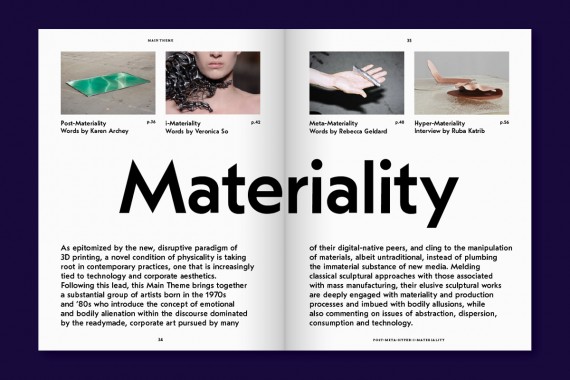
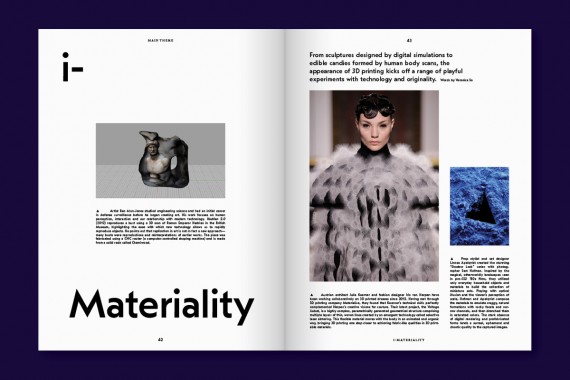
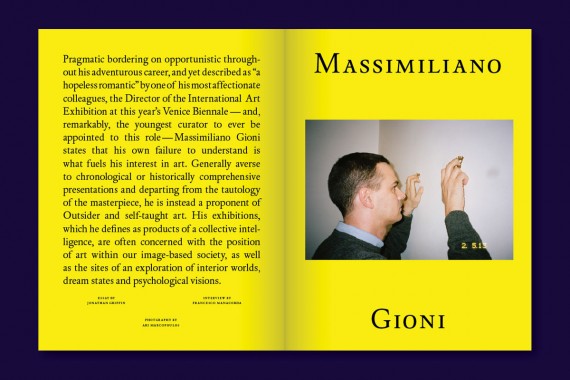
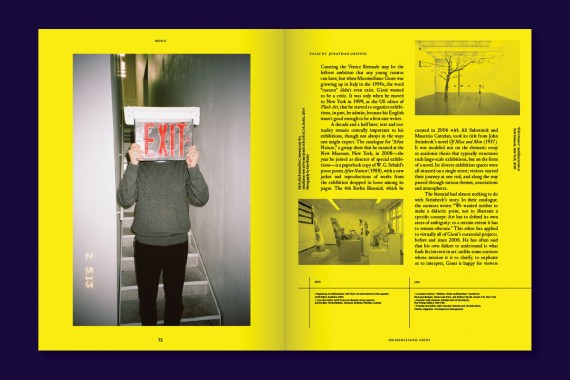
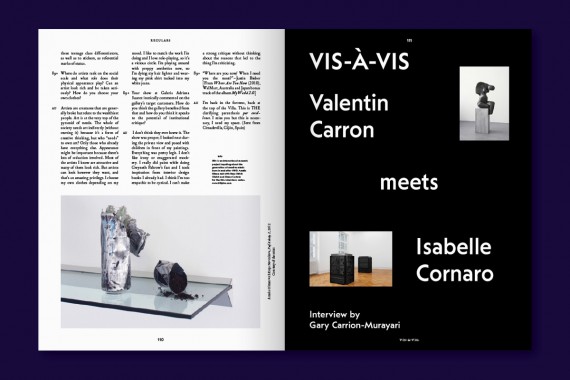
Alice Channer, Alice Rawsthorn, Alisa Baremboym, Amalia Ulman, amela Rosenkratz, Andra Ursuta, Ari Marcopoulos, Art, Ben Schumacher, Benjamin Senior, Culture, David Clarke, Distribution, Elena Filipovic, Felix Burrichter, Francesco Manacorda, Gary Carrion-Murayari, Hans Ulrich Obrist, Isabelle Cornaro, Jeremy Deller, Joanna Fiduccia, Jochen Lempert, Jonathan Griffin, KALEIDOSCOPE Press, Karen Archey, Kevin McGarry, Lam Tung-pang, Laura McLean-Ferristraces, Lawrence Kumpf, Leung Chi Wo, Magali Reus, Marlie Mul, Massimiliano Gioni, Nicholas Deshayes, Pablo Larios, Petrit Halilaj, Rebecca Geldard, Ruba Katrib, Sergei Tcherepnin, Shanzhai Biennial, Simon Castets, Sterling Ruby, Steve Bishop, Valentin Carron, Veronica So, Yngve Holen
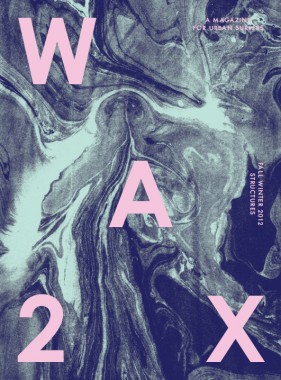
WAX Magazine 2, Structures
Softcover, 128 pp., offset 4/1, 200 x 270 mm
Edition of 500
ISSN 2167-8073
Published by WAX Magazine, Inc.
$15.00 ·
Featuring: Lawrence Luhring, Will Adler, Michael Marcelle, Kris Chatterson, Mercedes Maidana, Curtis Mann, John Luke, Mark Mahaney, and a free friction moment with Derek Hynd.
WAX is a bi-annual print publication exploring the intersection of art, culture and surfing in and around New York City. We believe that beauty and meaning can be found on sidewalks, boardwalks, skyscrapers and beaches alike. We’re interested in exploring the rich history of New York surfing, its beaches and residents and in finding a pathway of cultural creativity on and off the break. WAX shares the stories of area surfers who are also artists, designers, authors and auteurs. Each issue is organized around a unique theme, debuting with WAX Magazine 1, Dialogues in Spring 2012.
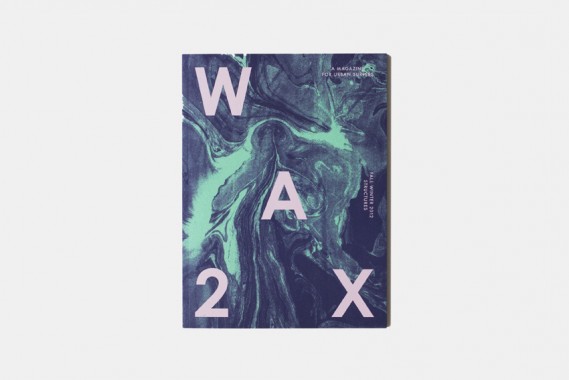
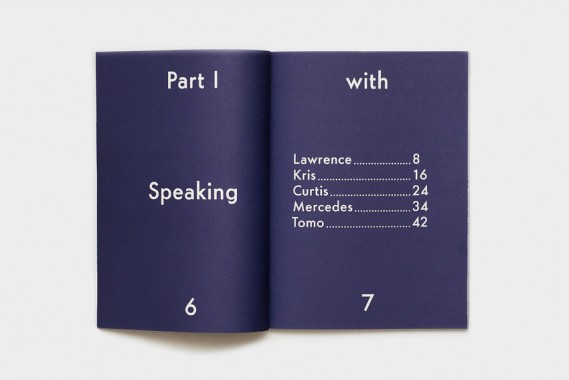
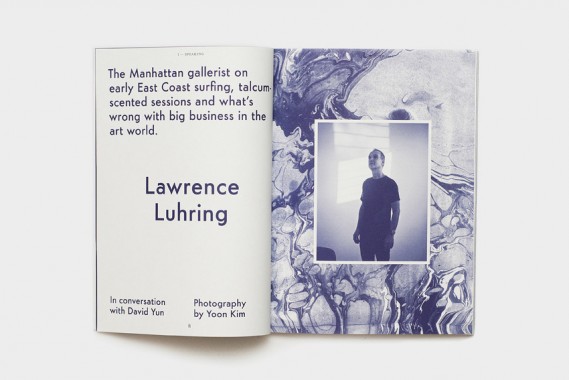
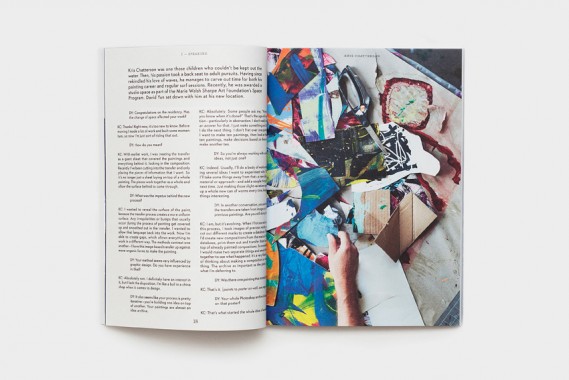
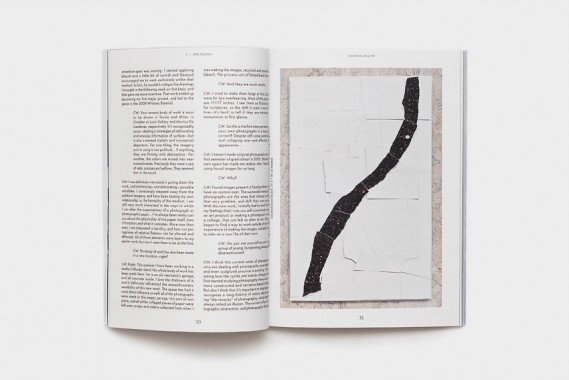
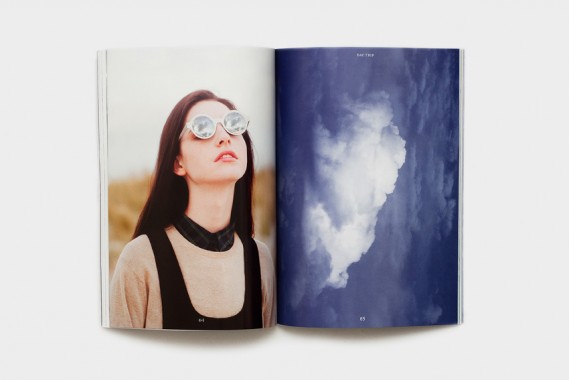
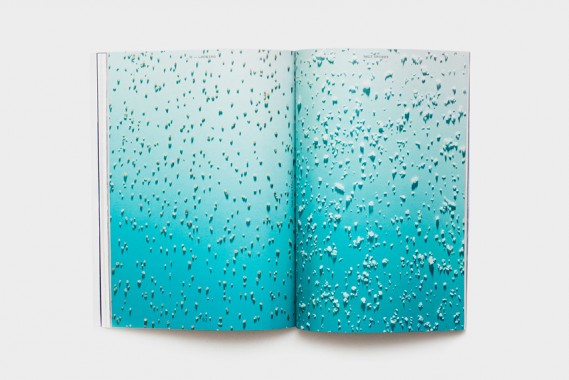
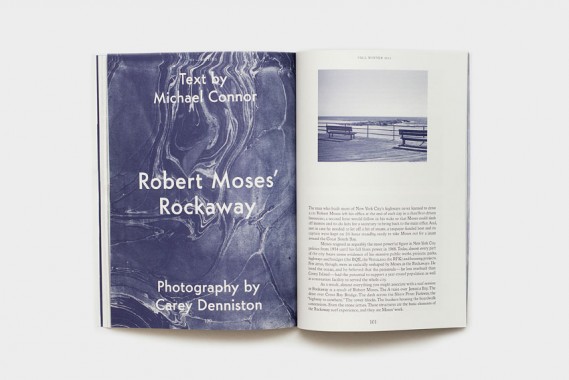
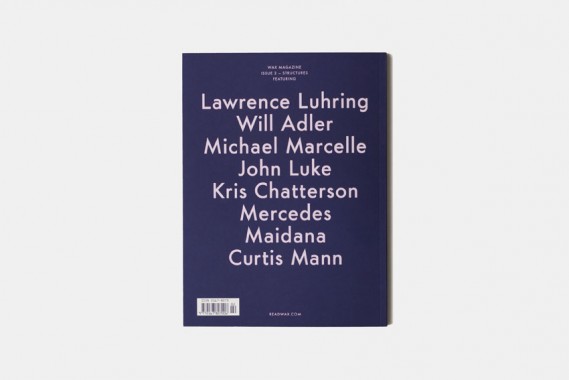
Abbye Churchill, Aeriel Brown, Art, Carey Denniston, Carmen Winant, Chris Rypkema, Cian O'Day, Culture, Curtis Mann, David Yun, Derek Hynd, Distribution, Elisa Routa, Jeff Mclane, John Luke, Jonathan Feldman, Kris Chatterson, Kristian Henson, Larissa Kasper, Lauren Snyder, Lawrence Luhring, LK Futura 1.0, Luke Stettner, Mark Mahaney, Matt McGregor-Mento, Mercedes Maidana, Michael Conner, Michael Marcelle, Mike Killion, Murray Fraser, New York, Photography, Rob Kulisek, Sport, Surfing, Tyler Breuer, Typography, WAX Magazine, Will Adler, Yoon Kim, Zak Klauck
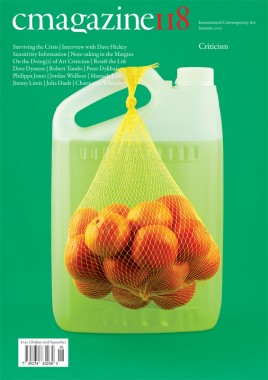
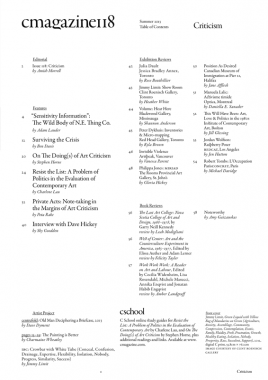
C Magazine 118, Criticism
Softcover, 60 pp., offset 4/1, 210 x 295 mm
Edition of 2200
ISSN 1480-5472
Published by C Magazine
$7.50 ·
Issue 118 includes feature essays by Adam Lauder on “Sensitivity Information”, Charlene Lau on “Problems in the Evaluation of Contemporary Art”, Stephen Horne on the “Doing(s) of Art Criticism”, Ben Davis on “Surviving the Crisis”, and Peta Rake on “Private Acts: Note taking in the Margins of Art Criticism”, as well as Sky Goodden in conversation with Dave Hickey.
Artist Projects include Dave Dyment’s Old Man Deciphering a Briefcase, and Charmaine Wheatley’s The Painting is Better.
Also, in this issue, reviews from across Canada and around the globe: Rose Bouthillier on Julia Dault, Jessica Bradley Annex, Toronto; Heather White on Jimmy Limit: Show Room, Clint Roenisch Gallery, Toronto; Shannon Anderson on Volume: Hear Here, Blackwood Gallery, Mississauga; Kyla Brown on Peter Dykhuis: Inventories & Micro-mapping, Red Head Gallery, Toronto; Vanessa Parent: Invisible Violence, Artspeak, Vancouver; Gloria Hickey on Philippa Jones: MIRIAD, The Rooms Provincial Art Gallery, St. John’s; Jane Affleck on Position As Desired, Canadian Museum of Immigration at Pier 21, Halifax; Daniella E. Sanader on Manuela Lalic: Activisme timide, Optica, Montreal; Jill Gleesing This Will Have Been: Art, Love & Politics in the 1980’s, Institute of Contemporary Art, Boston; Jen Hutton on Jordan Wolfson: Raspberry Poser, REDCAT, Los Angeles; and Michael Davidge on Robert Tombs: L’Occupation, ParisCONCRET, Paris.
C118 also includes book reviews of The Last Art College: Nova Scotia College of Art and Design, 1968-1978, review by Leah Modigliani; West of Center: Art and the Counterculture Experiment in America, 1965-1977, review by Felicity Tayler; and Work Work Work: A Reader on Art and Labour, review by Amber Landgraff.
Adam Lauder, Amber Landgraff, Art, Artspeak, Ben Davis, C Magazine, Charlene Lau, Clint Roenisch Gallery, Culture, Daniella E. Sanader, Dave Dyment, Dave Hickey, Distribution, Felicity Tayler, Gloria Hickey, Heather White, Jane Affleck, Jen Hutton, Jill Gleesing, Jordan Wolfson, Julia Dault, Kyla Brown, Leah Modigliani, Manuela Lalic, Michael Davidge, Peta Rake, Peter Dykhuis, Philippa Jones, Robert Tombs, Rose Bouthillier, Shannon Anderson, Sky Goodden, Vanessa Parent
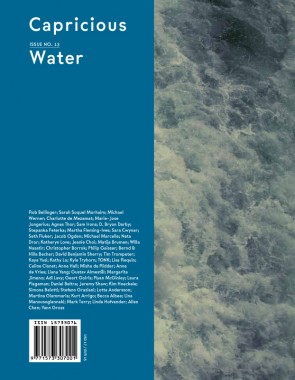
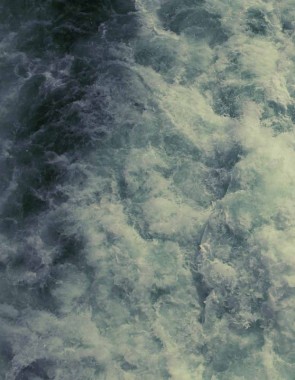
Capricious 13, Water
Softcover, 158 pp., offset 4/4, 210 x 270 mm
Edition of 2000
ISSN 1573-3076
Published by Capricious
$17.00 ·
With the theme of
Water, Capricious delves into one of the most pressing global concerns of the 21st century, finding a dynamic intersection between social consciousness and fine arts photography. Culled from hundreds of submissions, the editorial selection evokes not only the most visually profound forms of water, but documents our shifting relationship with water, whether it be through celebration, or sense of loss.
Capricious 13 moves through sections like Arid, Drift, and Quiet, a fluid visual narrative honoring water. And speaks to our palimpsest-like landscape, where the rise and fall of water lines are marked, and the history of water remains tangible. The work selected explores a myriad of watery dimensions, from the intimate, as water spills into our personal histories, quietly shaping our daily rituals; to global, as water is tamed, an ancient presence spun through industrialization. What ultimately comes to surface is, to what degree water has, in turn, overwhelmed and overcome us.
Also included, is a special chapter of curated texts by Hanna Wilde, including diverse variations on the theme, from poetry to political essay, to stage performance and film excerpt.
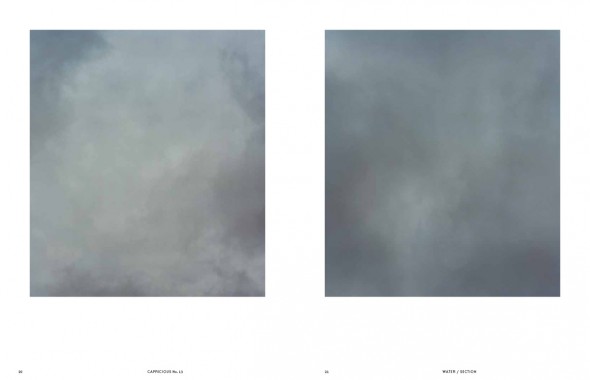
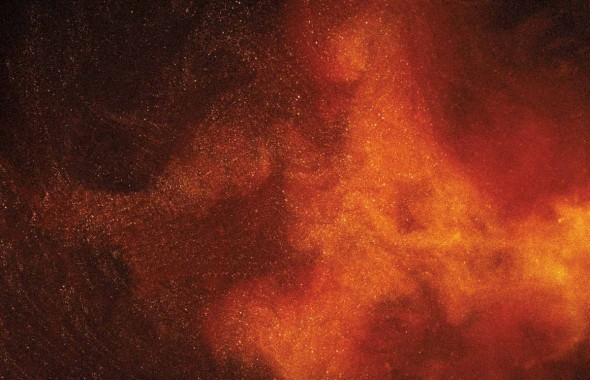
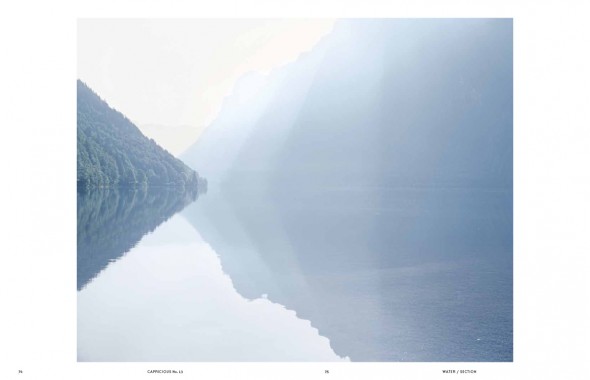


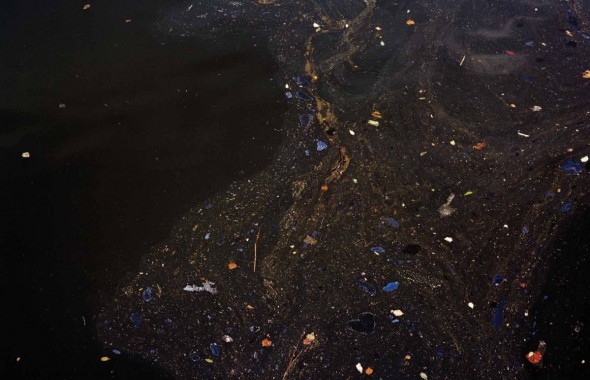
Adi Lavy, Agnes Thor, Allen Chen, Anne de Vries, Anne Hall, Art, Astrida Neimanis, Becca Albee, Bernd & Hilla Becher, Capricious, Celine Clanet, Charlotte de Mezamat, Christopher Borrok, Corrine Fitzpatrick, Culture, D. Bryon Darby, Daniel Beltra, David Benjamin Sherry, Distribution, Eli Leven, Ester Martin Bergsmark, Geert Goiris, Gustav Almestål, Hanna Wilde, Ingela Ihrman, Jacob Ogden, Jeanie Choi, Jeremy Shaw, Joff, Johan Eriksson, Katheryn Love, Kathy Lo, Kaya Yusi, Kim Hoeckele, Kurt Arrigo, Kyle Tryhorn, Laura Plageman, Liana Yang, Lina Manousogiannaki, Linda Hofvander, Lisa Requin, Lotta Andersson, Luiza Sa, Margarita Jimeno, Marie-Jose Jongerius, Mark Terry, Martha Fleming-Ives, Martina Giammaria, Matija Brumen, Michael Marcelle, Michael Werner, Misha de Ridder, Neta Dror, Philip Gaisser, Photography, Rob Bellinger, Ryan McGinley, Sadaf Rassoul Cameron, Sam Irons, Sara Cwynar, Sara Stridsberg, Sarah Soquel Morhaim, Seth Fluker, Simona Belotti, Sofia Hultin, Sophie Mörner, Stefano Graziani, Stepanka Peterka, Tim Trompeter, TONK, Vandana Shiva, Willa Nasatir, Yann Gross
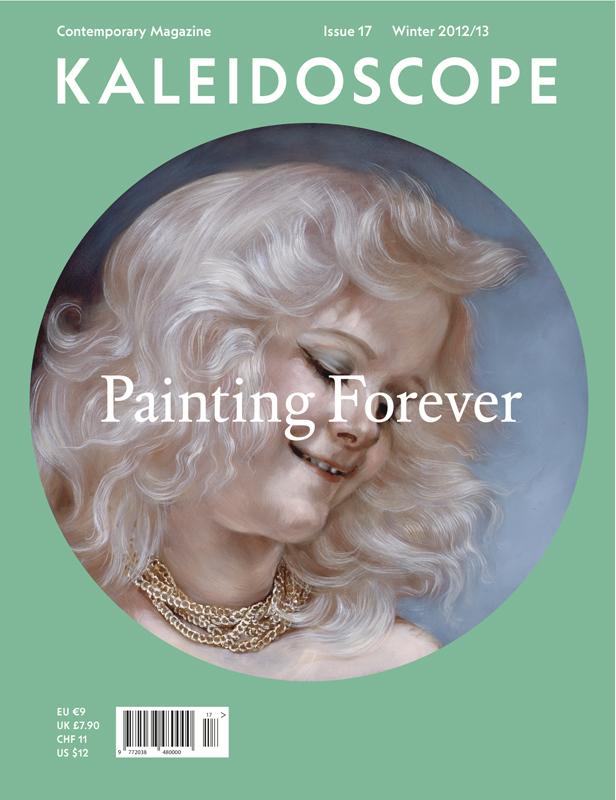
KALEIDOSCOPE Magazine 17, Painting Forever
Winter 2012/2013 — Painting Special Edition
Softcover, 224 pp. + three commissioned inserts, offset 4/4, 220 x 287 mm
ISSN 2038-4807
Published by KALEIDOSCOPE Press
$12.00 ·
“Painting Forever” is a special edition of KALEIDOSCOPE entirely dedicated to the past, present and future of the medium. The most persistent of art forms — one that was once given up for dead, then revived and is now more alive than ever — painting has been at the core of an intense research process that we undertook in collaboration with writers, curators and artists of different origins, beliefs and generations, all of whom share a desire to examine its history and envision its forthcoming possibilities. The questions we asked, and asked ourselves, were: Which artists are practicing painting in a relevant way today? Which conceptual and formal strategies, which modes of presentation and diffusion, do they deploy? And, ultimately, why? What are contemporary painters’ motives, references and perspectives? This issue is the tentative answer, and one which will hopefully foster further debate.
HIGHLIGHTS
In the opening section we introduce you to the work of five emerging artists: Oscar Murillo, Ryan Sullivan, Allison Katz, Jonathan Binet and Tala Madani. All born in the 1980s in different parts of the world, they’ve chosen to explore, revisit, celebrate and challenge the idea and practice of painting, with a common spirit of engagement and varying degrees of irony and irreverence.
MAIN THEME
This section, on the other hand, consists of extensive conversations with four artists born between the late 1950s and the early 1960s — Heimo Zoberning, John Currin, Amy Sillman and Michael Krebber — who represent divergent yet equally prominent and visionary approaches to the medium. Their common ground most revealingly lies in the influence they exert on a younger generation of artists. Accordingly, it’s no surprise that three of them hold teaching positions at eminent art schools, including the Academy of Fine Arts in Wien, Columbia University in New York and the Städelschule in Frankfurt.
MONO
This issue is likewise devoted to a painter, Los Angeles-based artist Dianna Molzan, whose practice occupies the liminal space between two-and three-dimensionality, between “pictures” and “objects,” and whose works convey a sophisticated research on abstraction encompassing elements drawn from the history of painting, as well as from design, fashion and visual culture at large.
REGULARS
This section features the work of NY–based artist Nikolas Gambaroff and of Italian conceptualist Giorgio Griffa, alongside discussions with the director of a prestigious foundation dedicated to the legacy of Pablo Picasso and the curators of an ambitious group exhibition, “Painter Painter,” soon to open at the Walker Art Center in Minneapolis.
INSERTS
Finally, this issue is enriched with commissioned inserts by three exciting young artists — Marieta Chirulescu, Fredrik Værslev and Keegan McHargue — that have each contributed a unique and affecting visual take on the making and experiencing of painting today.
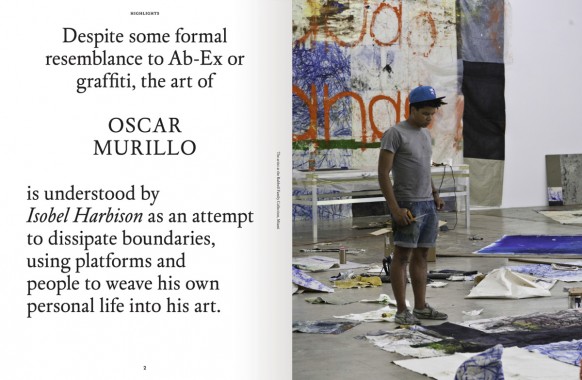
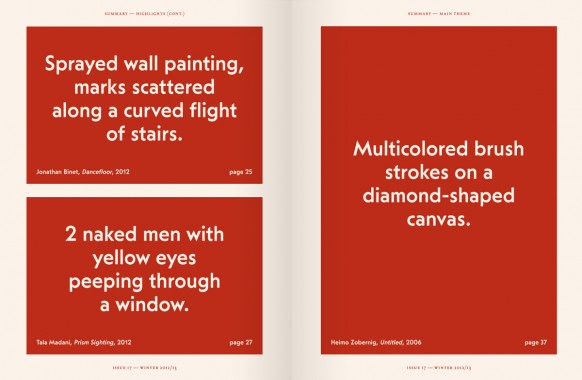
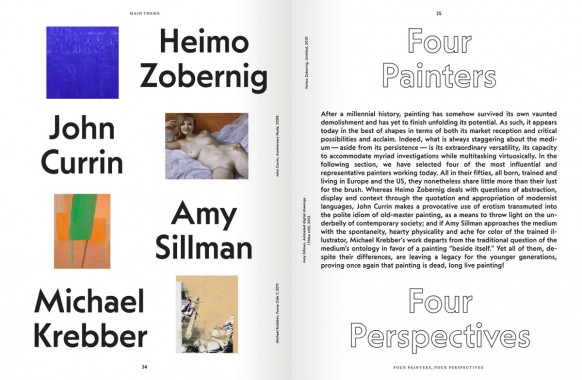
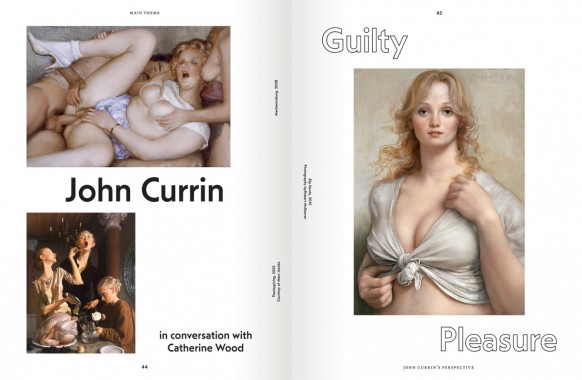
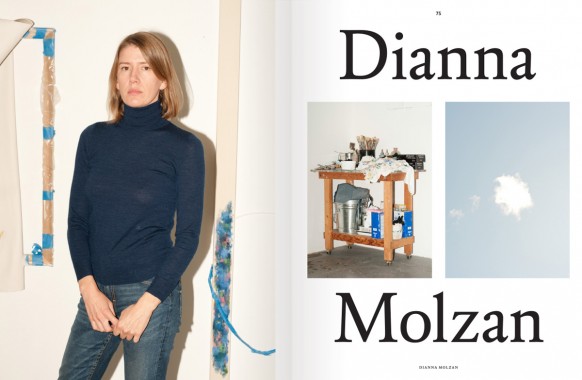
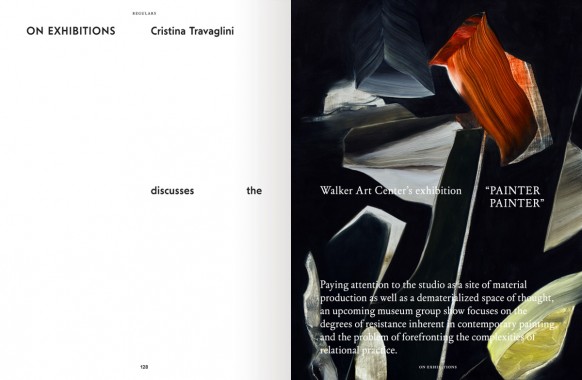
Allison Katz, Amy Sillman, Art, Cristina Travaglini, Culture, Dianna Molzan, Distribution, Fredrik Værslev, Giorgio Griffa, Heimo Zoberning, John Currin, Jonathan Binet, KALEIDOSCOPE Press, Keegan McHargue, Marieta Chirulescu, Michael Krebber, Nikolas Gambaroff, Oscar Murillo, Pablo Picasso, Painting, Ryan Sullivan, Tala Madani, Walker Art Center
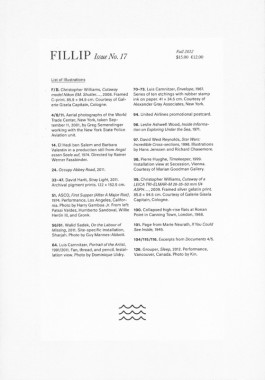
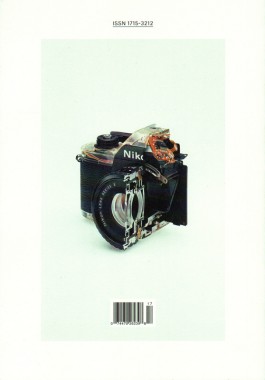
fillip 17
Softcover, 156 pp., offset 4/1, 170 x 245 mm
Edition of 2500
ISSN 1715-3212
ISBN 978-1-927354-07-0
Published by Fillip
$15.00 ·
Fillip is a publication of art, culture, and ideas released three times a year.
Taking as its point of departure Giorgio Agamben’s suggestion that subjectivity emerges from the relentless struggle between living beings and the various apparatuses in which they are captured, Apparatus, Capture, Trace, reflects on the links between such apparatuses whose operations today appear increasingly intertwined: photography and biopolitics.
1. Series: Apparatus, Capture, Trace
2. David Geers, Open Call
3. Walid Sadek and Mayssa Fattouh, Tranquility is Made in Pictures
4. David Hartt, Stray Light (Portfolio)
5. Renato Rodrigues da Silva, El Instrumento y Su Obra
6. James Langdo, A Eulogy for the Cutaway
7. Miwon Kwon and Helen Molesworth, Documents Magazine, 1992-2004
8. Caren Kaplan, Aerial Photography as Biopower in the Visual Culture of 9/11
9. Maria Muhle, Imitation of Life: Biopolitics and the Cinematographic Image
Art, Caren Kaplan, David Geers, David Hartt, Design, Distribution, Fillip, Giorgio Agamben, Helen Molesworth, James Langdo, James Langdon, Jeff Khonsary, Kate Steinmann, Kristina Lee Podesva, Maria Muhle, Mayssa Fattouh, Miwon Kwon, Renato Rodrigues da Silva, Walid Sadek
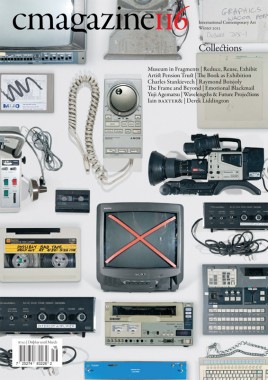
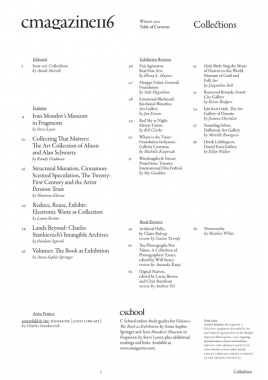
C Magazine 116, Collections
Softcover, 64 pp., offset 4/1, 210 x 295 mm
Edition of 2200
ISSN 1480-5472
Published by C Magazine
$7.50 ·
Issue 116, Collections, features essays by Steve Lyons on Ivan Moudov’s Museum in Fragments; Laura Kenins looking at Electronic Waste as Collection through the work of Laura Kikauka and Gordon Monahan, Eleanor King and Artifact Institute; Randy Gladman on the Art Collection of Alison and Alan Schwartz; Shannon d’Avout on Walid Raad and Artist Pension Trust; Anna-Sophie Springer on The Book as Exhibition, as well as an artist project by Charles Stankievech with an accompanying essay by Pandora Syperek. C Magazine 116 also includes reviews of exhibitions by Yuji Agematsu, Morgan Fisher, Raymond Boisjoly, Ian Baxter and Derek Liddington, as well as group exhibitions Emotional Blackmail at Kitchener-Waterloo Art Gallery, Wavelengths & Future Projections at the Toronto International Film Festival, Where is the Time at Foundation Izolyatsia in Ukraine, Sounding Selves at Dalhousie University Art Gallery, and Only Birds Sing the Music of Heaven in this World at the Museum of Craft and Folk Art.
Alan Schwartz, Alison Schwartz, Anna-Sophie Springer, Art, Artifact Institute, Artist Pension Trust, C Magazine, Charles Stankievech, Collections, Culture, Dalhousie University Art Gallery, Derek Liddington, Distribution, Eleanor King, Foundation Izolyatsia, Gordon Monahan, Ian Baxter, Ivan Moudov, Kitchener-Waterloo Art Gallery, Laura Kenins, Laura Kikauka, Morgan Fisher, Museum of Craft and Folk Art, Pandora Syperek, Randy Gladman, Raymond Boisjoly, Shannon d'Avout, Steve Lyons, Toronto International Film Festival, Walid Raad, Yuji Agematsu

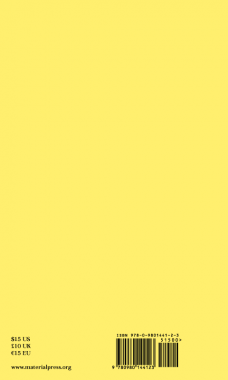
Ginny Cook and Kim Schoen, MATERIAL 3
Softcover, 96 pp. + insert, offset 2/1, 160 x 270 mm
Edition of 500
ISBN 978-0-9801441-2-3
Published by MATERIAL Press
$15.00 ·
MATERIAL exists as a platform for the artist’s voice. Each issue brings together a different group of artists who write, as well as a new collaboration with a graphic designer. During the production of this third issue, our designer Zak Jensen put forth the idea of concatenation — the act of linking together, or the state of being joined (
It was caused by an improbable concatenation of circumstances) (there was a connection between eating that pickle and having that nightmare)
(the joining of hands around the table).
Concatenation (c.1600, from L.L. concatenatus, pp. of concatenare “to link together,” from com- “together”+ catenare, from catena “a chain”) seemed an appropriate word for our editorial method. An unlikely assemblage of texts becomes connected through this process; uncanny linkages emerge. Wyeth appears twice. Performances interact. In this issue: voices that duel, voices that parrot, voices that hypothesize, translate, and meditate, voices that speak simultaneously. As Roland Barthes writes, we have assembled these textual events, as “pleasure in pieces; language in pieces; culture in pieces,” to build upon one another into something new.*
*Roland Barthes, The Pleasure of the Text, trans. Richard Miller (New York: Hill and Wang, 1975), p. 51
CONTRIBUTORS
Farrah Karapetian, Paul Zelevansky, Renee Petropoulous, Nate Harrison, James Welling, Natalie Häusler, Harold Abramowitz, Shana Lutker Stephanie Taylor, Alice Könitz, Frank Chang, and Emily Mast.
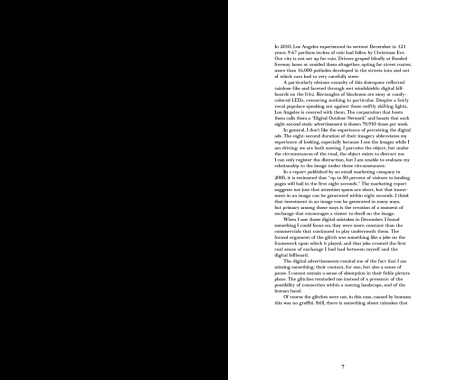
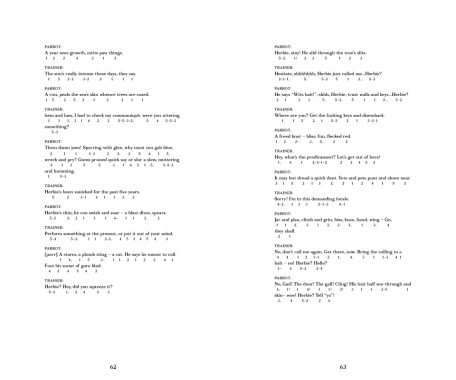
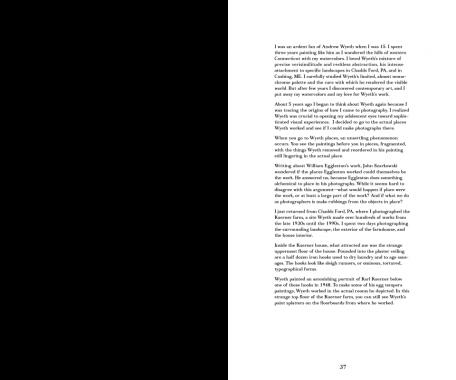
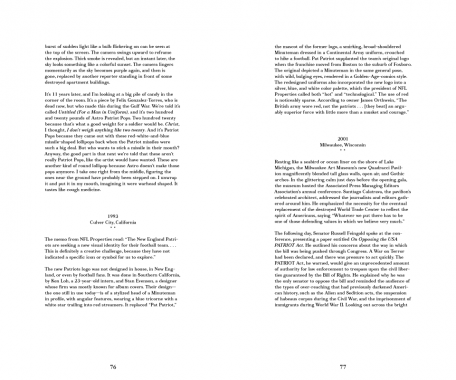
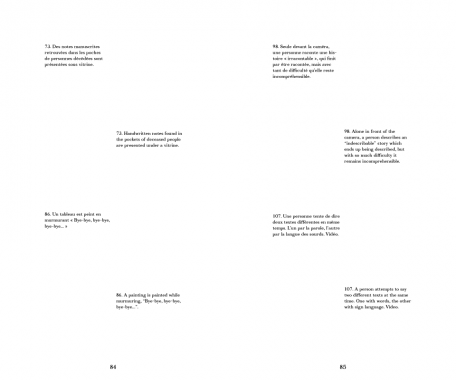
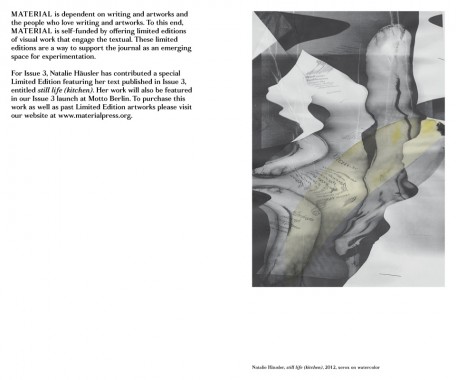
Alice Konitz, Andrew Wyeth, Art, Catherine Guiral, Concatenare, Criticism, Daniel Lucas, Design, Distribution, Dorit Cypis, Emily Mast, Farrah Karapetian, Frank Chang, Ginny Cook, Harold Abramowitz, James Welling, John Stezaker, Jonathan Miles, Kim Schoen, MATERIAL Press, Natalie Häusler, Nate Harrison, Olivier Richon, Paul Zelevansky, Quentin Walesch, Renee Petropoulous, Richard Miller, Roland Barthes, Shana Lutker, Stephanie Taylor, Theory, Thomas Lawson, Typecraft Wood & Jones, Typography, Wendy Schoen, Zak Jensen
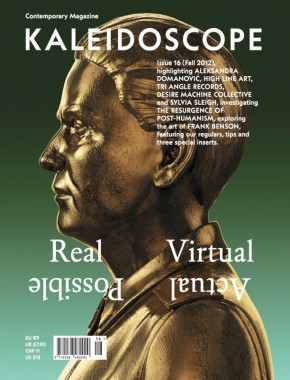
KALEIDOSCOPE Magazine 16 — Fall 2012
Softcover, 210 pp. + Ken Price Drawings insert, offset 4/4, 220 x 287 mm
ISSN 2038-4807
Published by KALEIDOSCOPE Press
$12.00 ·
At the core of a platform that includes an exhibition space and an independent publishing house, KALEIDOSCOPE is an international quarterly of contemporary art and culture founded in 2009 in Milan. Distributed worldwide on a seasonal basis, it has gained widespread recognition as a trusted and timely guide to the present (but also to the past and possible futures), unique in its interdisciplinary and unconventional approach.
HIGHLIGHTS
This issue’s opening section features Aleksandra Domanovic, whose videos and sculptures are seen by Pablo Larios as embodiments of the perpetually productive disunion of politics and art; the ambitious public art program of New York’s High Line, described by Piper Marshall as one that confronts artists with many challenges; the record label Tri Angle, whose founder Robin Carolan talks to Ruth Saxelby about how to embody the zeitgeist of electronic music; the Indian duo Desire Machine Collective, who discuss with Sandhini Poddar and Ulrich Baer about mapping an experimental history of colonization; and American painter Sylvia Sleigh, whose elusive politics is contrasted by Joanna Fiduccia to the detailed realism of her portraits.
MAIN THEME
The blend of cybernetics and underground culture realized in the symbolic and mythological repertoire of Cyberpunk continues to inspire sci-fi narratives and permeate the arts, reinforcing its status as a powerful aesthetic. This issue examines the emergence of an art that addresses the processes of mechanization, desexualisation and reification of the human body, and how they relate to questions of identity, morality and fantasy. Featured contributions include Michele D’Aurizio’s overview of the work of a new generation of artists; Karen Archey’s analysis of the work of Canadian artist David Altmejd; a discussion between Brody Condon and Jason Brown coordinated by DIS magazine; and a conversation between young artist Timur Si-Qin and influential philosopher Manuel De Landa.
MONO
Comprising an essay by Alessandro Rabottini, an interview by Matt Keegan and a photographic portrait by Grant Willing, this issue’s MONO is devoted to American artist Frank Benson, whose work rides the dialectic between the space of the photographic image and the space of sculpture. Evoking celebrated artists like Charles Ray, Jeff Koons and Robert Gober, Benson uses the latest technology available and yet imbues the sculptural process with a profound understanding of physical materiality — making works that oscillate between analogue and digital, solidity and suspension, humor and elegance.
REGULARS
Hans Ulrich Obrist interviews the New York-based provocateur Liz Magic Laser; Dorothée Dupuis introduces the hidden life of Marseille; Luca Cerizza analyzes the emotional topography of Alberto Garutti; and Carson Chan meets the DAAD’s visual arts director Ariane Beyn. The edition is enriched by our seasonal tips on following, reading, listening, stopping by, meeting and visiting; as well as by three special inserts — drawings by Ken Price, stickers by Alistair Frost and images by Alistair Frost.
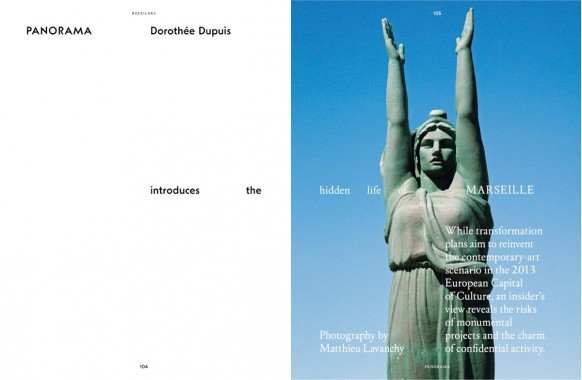
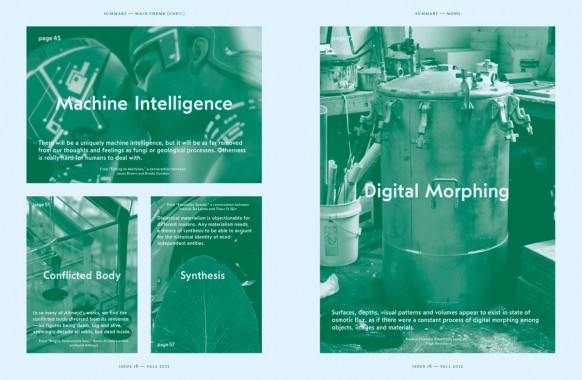
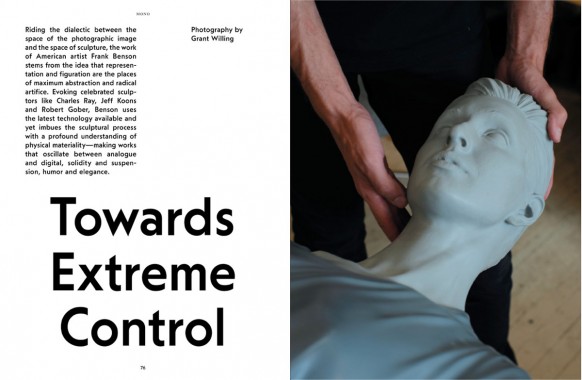
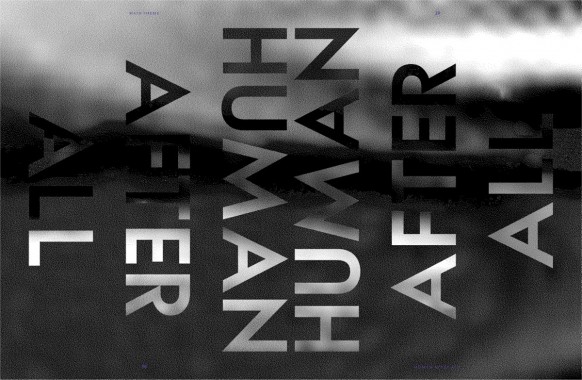
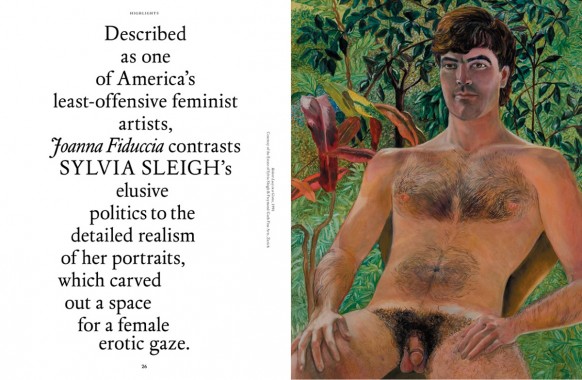
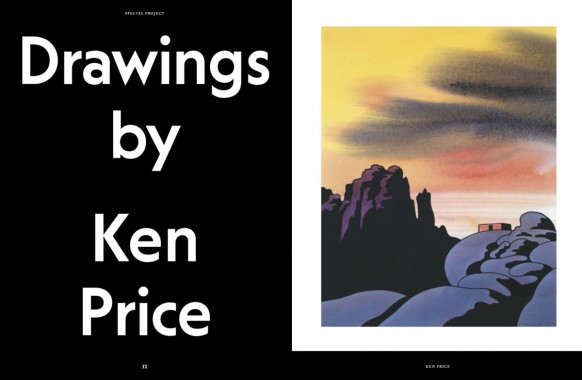
Alberto Garutti, Aleksandra Domanovic, Alessandro Rabottini, Alistair Frost, Ariane Beyn, Art, Brody Condon, Carson Chan, Charles Ray, Cyberpunk, David Altmejd, Desire Machine Collective, DIS Magazine, Distribution, Dorothée Dupuis, Drawing, Frank Benson, Grant Willing, Hans Ulrich Obrist, Jason Brown, Jeff Koons, Joanna Fiduccia, KALEIDOSCOPE Press, Karen Archey, Ken Price, Liz Magic Laser, Luca Cerizza, Manuel De Landa, Matt Keegan, Michele D'Aurizio, Pablo Larios, Piper Marshall, Robert Gober, Robin Carolan, Ruth Saxelby, Sandhini Poddar, Sculpture, Sylvia Sleigh, Timur Si-Qin, Tri Angle, Ulrich Baer
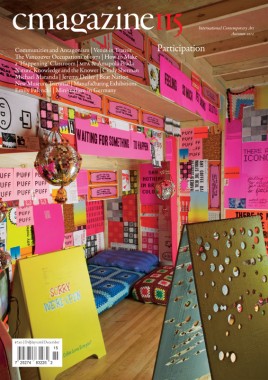
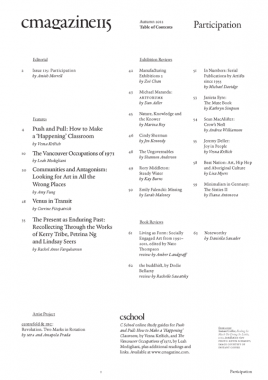
C Magazine 115, Participation
Softcover, 64 pp., offset 4/1, 210 x 295 mm
Edition of 2200
ISSN 1480-5472
Published by C Magazine
$7.50 ·
Issue 115, Participation, features essays by Vesna Krstich on how to make a ‘Happening’ classroom, Leah Modigliani on the Vancouver Occupations of 1971, Amy Fung on communities and antagonism, Rachel Anne Farquharson on recollecting through the works of Kerry Tribe, Petrina Ng and Lindsay Seers, as well as Corrine Fitzpatrick in response to our recent “Men” issue. C Magazine 115 also includes an artist project by MPA and Amapola Prada, book reviews and reviews of exhibitions by Jeremy Deller, Janieta Eyre, Emily Falencki, Sean MacAlister, Michael Maranda, Rory Middleton and Cindy Sherman, among others.
Amapola Prada, Amy Fung, Art, C Magazine, Cindy Sherman, Corrine Fitzpatrick, Culture, Distribution, Emily Falencki, Janieta Eyre, Jeremy Deller, Kerry Tribe, Leah Modigliani, Lindsay Seers, Michael Maranda, MPA, Petrina Ng, Rachel Anne Farquharson, Rory Middleton, Sean MacAlister, Vesna Krstich
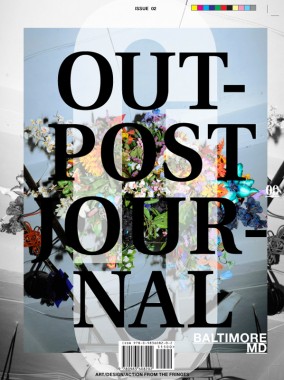
Outpost Journal 2, Baltimore
Softcover, 64 pp. + insert, offset 4/4, 9 x 12 inches
Edition of 500
ISBN 978-0-9836082-1-9
Published by Outpost Journal
$15.00 ·
Outpost is an annual print publication on art, design and community action from cities that have been traditionally underexposed beyond their local contexts. Each beautifully produced and visually engaging issue of Outpost focuses on a single urban location and comes packaged with a limited edition print by an artist from the featured city. Outpost is a journey into the creative heart of a place, and via features like “Secretly Famous” (profiles of the most infamous artsy locals), guerrilla engagements with tourist attractions, historical explorations, mapping projects, and deep dives into artist collectives and organizations, Outpost exposes the myriad ways in which unique local communities arise through creative collaboration and production.
Exploratory and playful, critical with a sense of levity, and inspired by hand-drawn maps, flags, totem poles, poorly pixelated iPhone photos, moody landscapes, and the spirit of adventure, Outpost is dedicated to strengthening ties between communities and spreading new ideas about how creative culture can change our world.
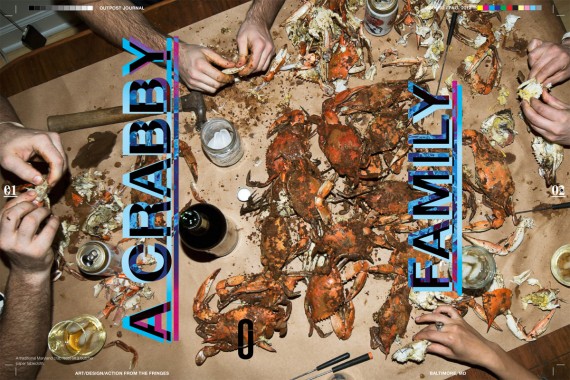
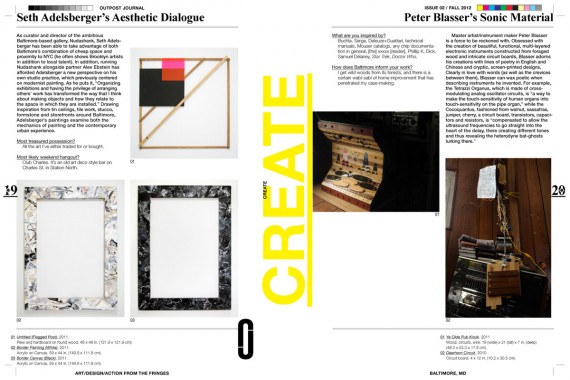
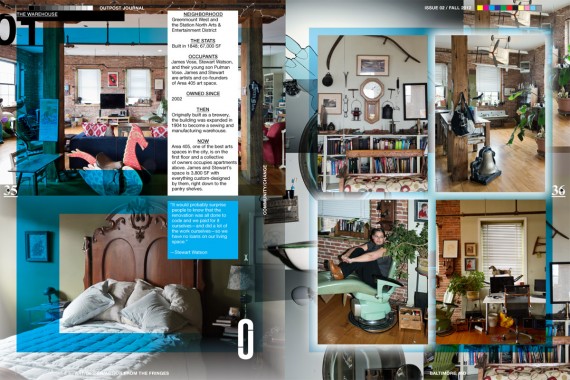
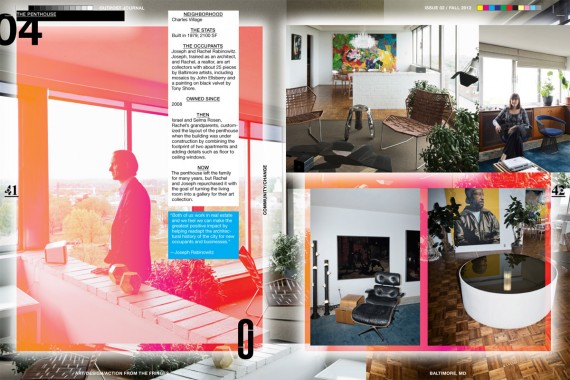
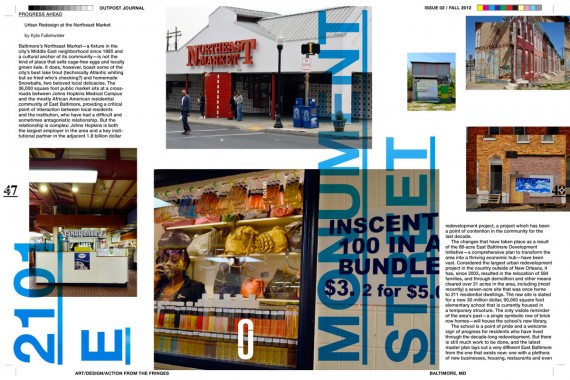
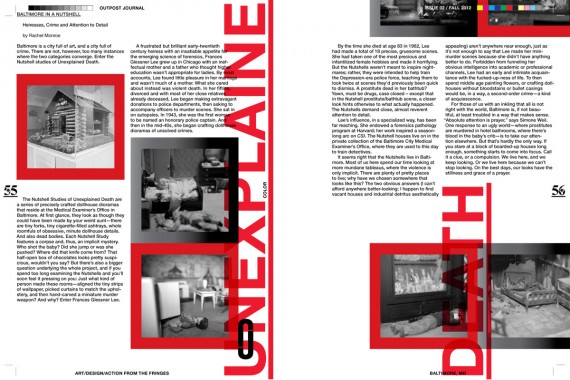
Aja Blanc, Alex Kwartler, Anusha Venkataraman, Architecture, Art, Boddan Mohora, Bogdan Mohora, Caitlin Cunningham, Carly Ptak, Clay Rockefeller, Culture, Dan Deacon, Design, Distribution, Elizabeth Evitts Dickinson, Gary Kachadourian, Gillian Kiley, James Rieck, Jay Peter Salvas, Jeanne Vaccaro, John Bohl, Jori Ketten, Kyla Fullenwider, Laure Drogoul, Lesser Gonzalez Alvarez, Loring Cornish, Luke T. Baker, Maggie Lange, Manya Rubinstein, Matthew Williams, Mike Taylor, Outpost Journal, Patrick Casey O'Brien, Pete Oyler, Peter Blasser, Phoebe Jean, Phoebe Jean Dunne, Rachel Monroe, Seth Adelsberger, Shaun Flynn, Twig Harper
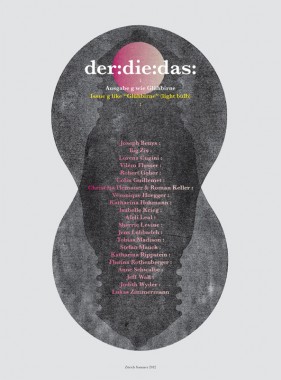
der:die:das:, Issue g like glühbirne (light bulb)
Softcover, 92 pp., offset 4/1, 200 x 270 mm
English and German
Edition of 1000
ISSN 1663-2508
Published by der:die:das:
$20.00 ·
Some words on, and images of, glühbrine (light bulb). Featuring: Joseph Beuys, Big Zis, Lorenz Cugini, Vilem Flusser, Robert Gober, Colin Guillemet, Christina Hemauer, Roman Keller, Veronique Hoegger, et al.
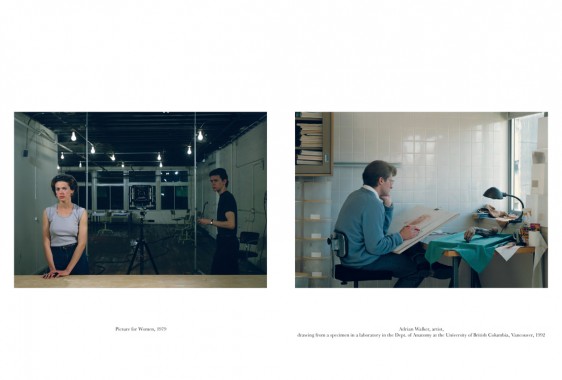
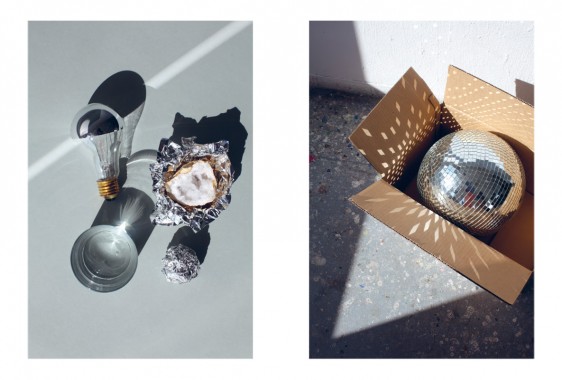
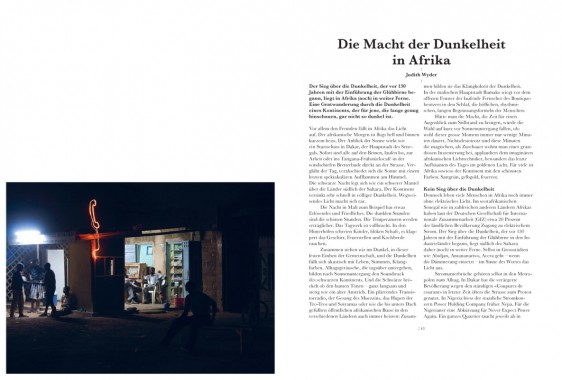
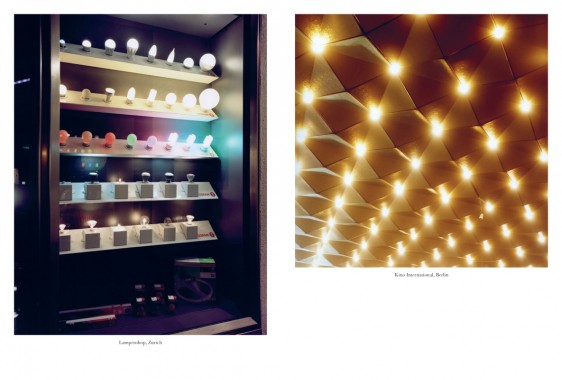
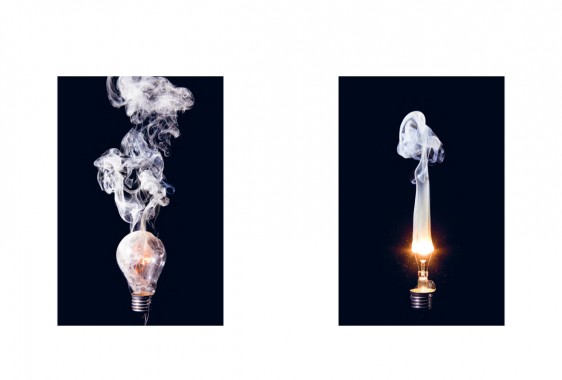
Aleli Leal, Anne Schwalbe, Art, Big Zis, Christina Hemauer, Colin Guillemet, Culture, der:die:das:, Distribution, Flurina Rothenberger, Isabelle Krieg, Jeff Wall, Jens Lubbadeh, Joseph Beuys, Judith Wyder, Katharina Hohmann, Katharina Rippstein, Lorenz Cugini, Lukas Zimmermann, Photography, Robert Gober, Roman Keller, Sculpture, Sherrie Levine, Stefan Mauck, Tobias Madison, Veronique Hoegger, Vilem Flusser

















































































